1. Import new platform of xsa file from vivado.
Prepare the platform with xsa in vivado, 64k memory is used. It is Ok for 32k , final code size is about 10k. According to design flow in previous blogs.
2. Creating new Vitis Projects
The platform settings

The application settings
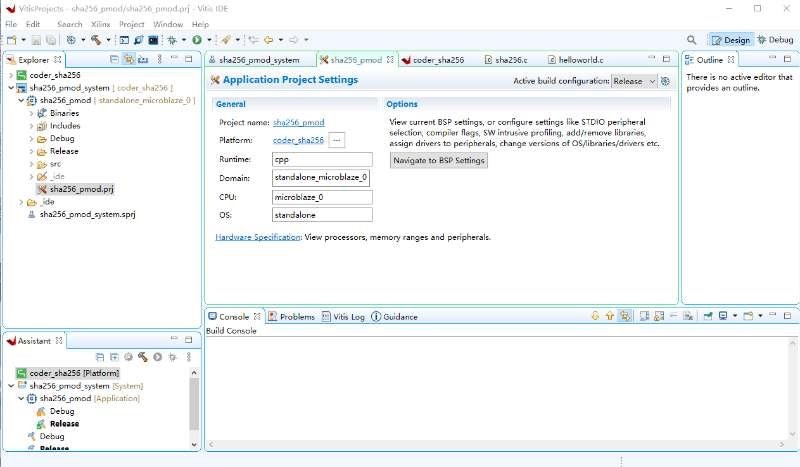
THE architecture
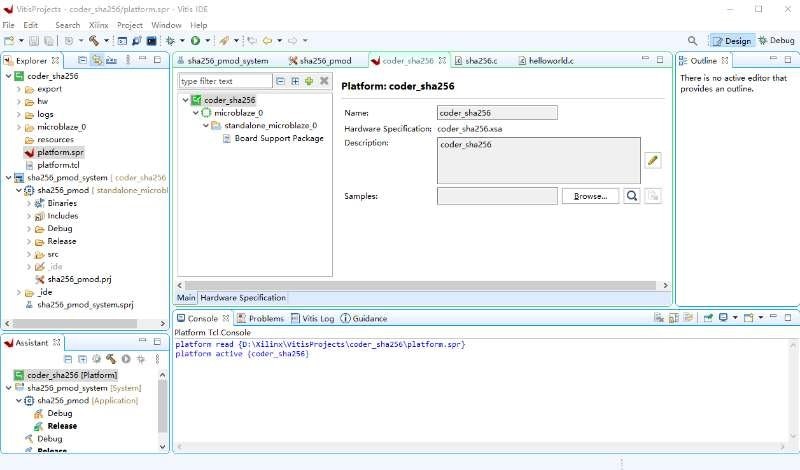
3. Coding
Make the sha-256 code , revised from open-sourced code in github,
The main() functions, build to generate binary file in elf.
#include <stdio.h>
#include <memory.h>
#include <string.h>
#include "platform.h"
#include "xil_printf.h"
#include "xparameters.h"
#include "xgpio.h"
#include "xil_types.h"
#include "sha256.h"
int main()
{
init_platform();
xil_printf("Entered function main\r\n");
sha256();
xil_printf("End of application.\n\n\r");
cleanup_platform();
return 0;
}
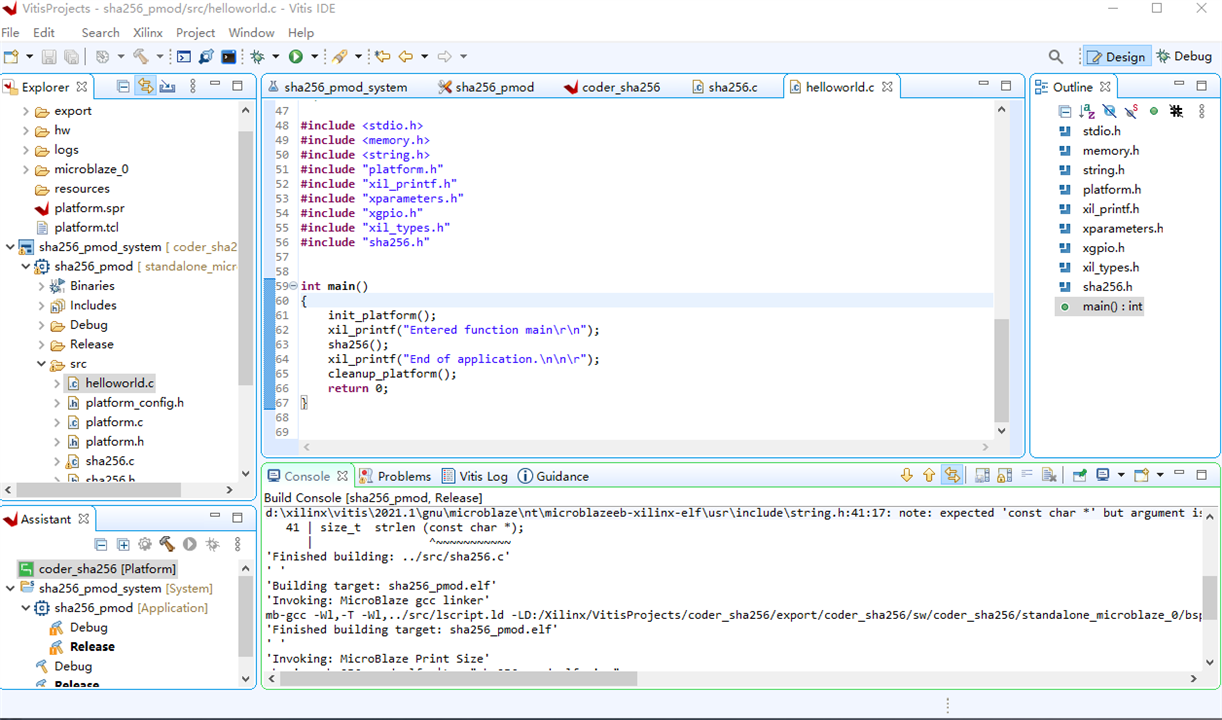
And sha256() function perform hashing
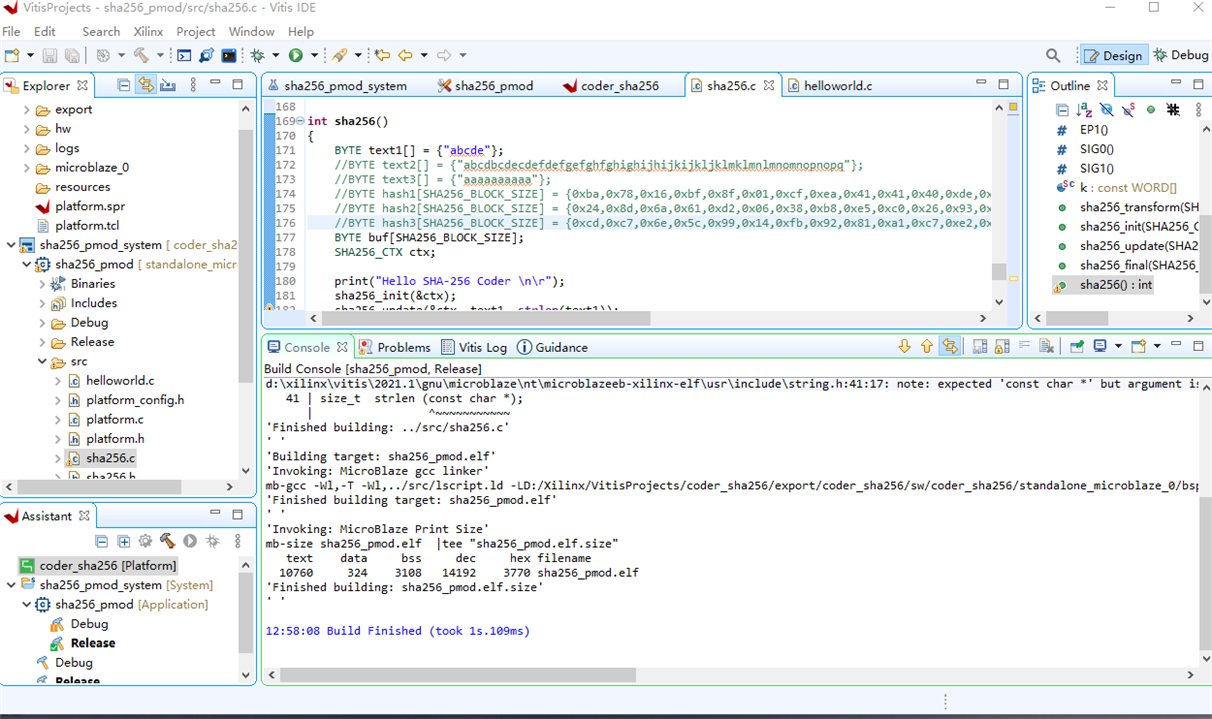
4. The result is Ok. hash for "abc" is same as precalculation value,
BYTE text1[] = {"abc"};
BYTE hash1[SHA256_BLOCK_SIZE] = {0xba,0x78,0x16,0xbf,0x8f,0x01,0xcf,0xea,0x41,0x41,0x40,0xde,0x5d,0xae,0x22,0x23,0xb0,0x03,0x61,0xa3,0x96,0x17,0x7a,0x9c,0xb4,0x10,0xff,0x61,0xf2,0x00,0x15,0xad};
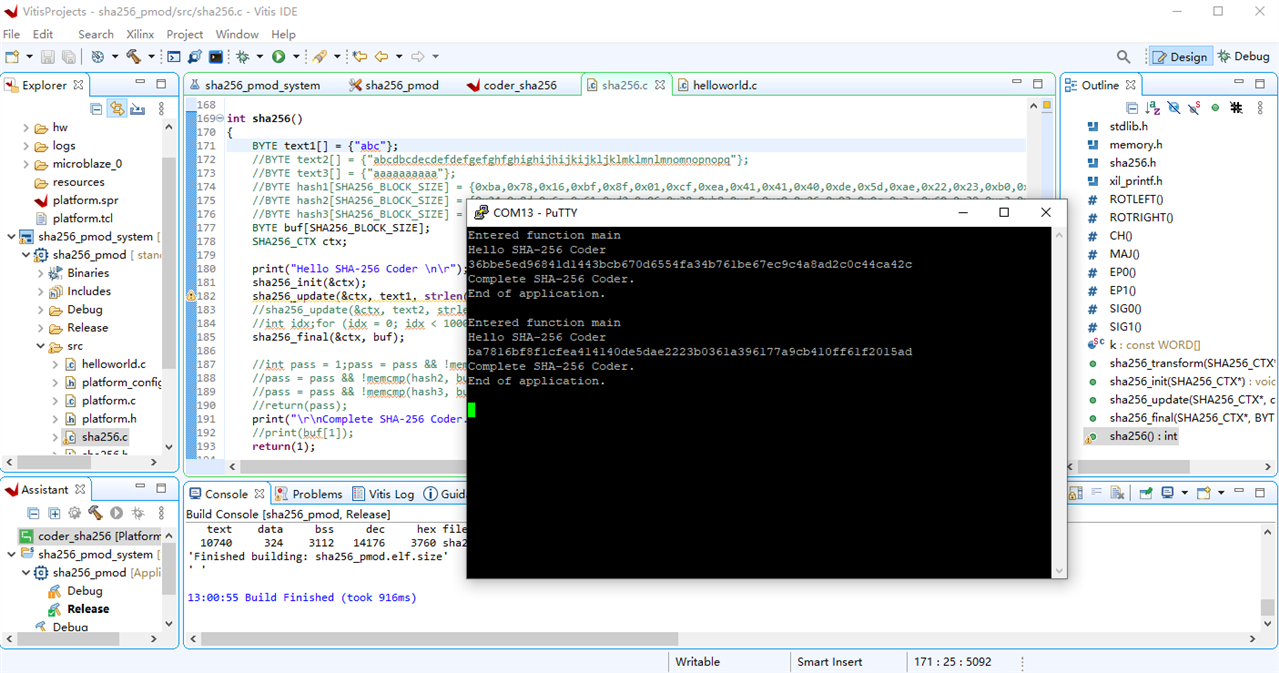
5. SHA-256 algorithm
SHA-256 is prevail hash algorithm widely applicable. HASH is foundation of Proof of Work in blockchain technology.
/*
* sha256.c
*
* Created on: 2022Äê1ÔÂ7ÈÕ
* Author: north
*/
/*************************** HEADER FILES ***************************/
#include <stdlib.h>
#include <memory.h>
#include "sha256.h"
#include "xil_printf.h"
/****************************** MACROS ******************************/
#define ROTLEFT(a,b) (((a) << (b)) | ((a) >> (32-(b))))
#define ROTRIGHT(a,b) (((a) >> (b)) | ((a) << (32-(b))))
#define CH(x,y,z) (((x) & (y)) ^ (~(x) & (z)))
#define MAJ(x,y,z) (((x) & (y)) ^ ((x) & (z)) ^ ((y) & (z)))
#define EP0(x) (ROTRIGHT(x,2) ^ ROTRIGHT(x,13) ^ ROTRIGHT(x,22))
#define EP1(x) (ROTRIGHT(x,6) ^ ROTRIGHT(x,11) ^ ROTRIGHT(x,25))
#define SIG0(x) (ROTRIGHT(x,7) ^ ROTRIGHT(x,18) ^ ((x) >> 3))
#define SIG1(x) (ROTRIGHT(x,17) ^ ROTRIGHT(x,19) ^ ((x) >> 10))
/**************************** VARIABLES *****************************/
static const WORD k[64] = {
0x428a2f98,0x71374491,0xb5c0fbcf,0xe9b5dba5,0x3956c25b,0x59f111f1,0x923f82a4,0xab1c5ed5,
0xd807aa98,0x12835b01,0x243185be,0x550c7dc3,0x72be5d74,0x80deb1fe,0x9bdc06a7,0xc19bf174,
0xe49b69c1,0xefbe4786,0x0fc19dc6,0x240ca1cc,0x2de92c6f,0x4a7484aa,0x5cb0a9dc,0x76f988da,
0x983e5152,0xa831c66d,0xb00327c8,0xbf597fc7,0xc6e00bf3,0xd5a79147,0x06ca6351,0x14292967,
0x27b70a85,0x2e1b2138,0x4d2c6dfc,0x53380d13,0x650a7354,0x766a0abb,0x81c2c92e,0x92722c85,
0xa2bfe8a1,0xa81a664b,0xc24b8b70,0xc76c51a3,0xd192e819,0xd6990624,0xf40e3585,0x106aa070,
0x19a4c116,0x1e376c08,0x2748774c,0x34b0bcb5,0x391c0cb3,0x4ed8aa4a,0x5b9cca4f,0x682e6ff3,
0x748f82ee,0x78a5636f,0x84c87814,0x8cc70208,0x90befffa,0xa4506ceb,0xbef9a3f7,0xc67178f2
};
void sha256_transform(SHA256_CTX *ctx, const BYTE data[])
{
WORD a, b, c, d, e, f, g, h, i, j, t1, t2, m[64];
// initialization
for (i = 0, j = 0; i < 16; ++i, j += 4)
m[i] = (data[j] << 24) | (data[j + 1] << 16) | (data[j + 2] << 8) | (data[j + 3]);
for ( ; i < 64; ++i)
m[i] = SIG1(m[i - 2]) + m[i - 7] + SIG0(m[i - 15]) + m[i - 16];
a = ctx->state[0];
b = ctx->state[1];
c = ctx->state[2];
d = ctx->state[3];
e = ctx->state[4];
f = ctx->state[5];
g = ctx->state[6];
h = ctx->state[7];
for (i = 0; i < 64; ++i) {
t1 = h + EP1(e) + CH(e,f,g) + k[i] + m[i];
t2 = EP0(a) + MAJ(a,b,c);
h = g;
g = f;
f = e;
e = d + t1;
d = c;
c = b;
b = a;
a = t1 + t2;
}
ctx->state[0] += a;
ctx->state[1] += b;
ctx->state[2] += c;
ctx->state[3] += d;
ctx->state[4] += e;
ctx->state[5] += f;
ctx->state[6] += g;
ctx->state[7] += h;
}
void sha256_init(SHA256_CTX *ctx)
{
ctx->datalen = 0;
ctx->bitlen = 0;
ctx->state[0] = 0x6a09e667;
ctx->state[1] = 0xbb67ae85;
ctx->state[2] = 0x3c6ef372;
ctx->state[3] = 0xa54ff53a;
ctx->state[4] = 0x510e527f;
ctx->state[5] = 0x9b05688c;
ctx->state[6] = 0x1f83d9ab;
ctx->state[7] = 0x5be0cd19;
}
void sha256_update(SHA256_CTX *ctx, const BYTE data[], size_t len)
{
WORD i;
for (i = 0; i < len; ++i) {
ctx->data[ctx->datalen] = data[i];
ctx->datalen++;
if (ctx->datalen == 64) {
// 64 byte = 512 bit means the buffer ctx->data has fully stored one chunk of message
// so do the sha256 hash map for the current chunk
sha256_transform(ctx, ctx->data);
ctx->bitlen += 512;
ctx->datalen = 0;
}
}
}
void sha256_final(SHA256_CTX *ctx, BYTE hash[])
{
WORD i;
char opt[8];
i = ctx->datalen;
// Pad whatever data is left in the buffer.
if (ctx->datalen < 56) {
ctx->data[i++] = 0x80; // pad 10000000 = 0x80
while (i < 56)
ctx->data[i++] = 0x00;
}
else {
ctx->data[i++] = 0x80;
while (i < 64)
ctx->data[i++] = 0x00;
sha256_transform(ctx, ctx->data);
memset(ctx->data, 0, 56);
}
// Append to the padding the total message's length in bits and transform.
ctx->bitlen += ctx->datalen * 8;
ctx->data[63] = ctx->bitlen;
ctx->data[62] = ctx->bitlen >> 8;
ctx->data[61] = ctx->bitlen >> 16;
ctx->data[60] = ctx->bitlen >> 24;
ctx->data[59] = ctx->bitlen >> 32;
ctx->data[58] = ctx->bitlen >> 40;
ctx->data[57] = ctx->bitlen >> 48;
ctx->data[56] = ctx->bitlen >> 56;
sha256_transform(ctx, ctx->data);
// copying the final state to the output hash(use big endian).
for (i = 0; i < 4; ++i) {
hash[i] = (ctx->state[0] >> (24 - i * 8)) & 0x000000ff;
hash[i + 4] = (ctx->state[1] >> (24 - i * 8)) & 0x000000ff;
hash[i + 8] = (ctx->state[2] >> (24 - i * 8)) & 0x000000ff;
hash[i + 12] = (ctx->state[3] >> (24 - i * 8)) & 0x000000ff;
hash[i + 16] = (ctx->state[4] >> (24 - i * 8)) & 0x000000ff;
hash[i + 20] = (ctx->state[5] >> (24 - i * 8)) & 0x000000ff;
hash[i + 24] = (ctx->state[6] >> (24 - i * 8)) & 0x000000ff;
hash[i + 28] = (ctx->state[7] >> (24 - i * 8)) & 0x000000ff;
}
for (i = 0; i < 32; ++i) {
//char opt = hash[i];
itoa(hash[i],opt,16);
xil_printf(opt);
}
//unsigned char opt= to_string(80);xil_printf(opt);
//int aa=0xef; char c[10]; itoa(aa,c,16); xil_printf(c); itoa(hash[16],opt,16); xil_printf(opt);
}
int sha256()
{
BYTE text1[] = {"abc"};
//BYTE text2[] = {"abcdbcdecdefdefgefghfghighijhijkijkljklmklmnlmnomnopnopq"};
//BYTE text3[] = {"aaaaaaaaaa"};
//BYTE hash1[SHA256_BLOCK_SIZE] = {0xba,0x78,0x16,0xbf,0x8f,0x01,0xcf,0xea,0x41,0x41,0x40,0xde,0x5d,0xae,0x22,0x23,0xb0,0x03,0x61,0xa3,0x96,0x17,0x7a,0x9c,0xb4,0x10,0xff,0x61,0xf2,0x00,0x15,0xad};
//BYTE hash2[SHA256_BLOCK_SIZE] = {0x24,0x8d,0x6a,0x61,0xd2,0x06,0x38,0xb8,0xe5,0xc0,0x26,0x93,0x0c,0x3e,0x60,0x39,0xa3,0x3c,0xe4,0x59,0x64,0xff,0x21,0x67,0xf6,0xec,0xed,0xd4,0x19,0xdb,0x06,0xc1};
//BYTE hash3[SHA256_BLOCK_SIZE] = {0xcd,0xc7,0x6e,0x5c,0x99,0x14,0xfb,0x92,0x81,0xa1,0xc7,0xe2,0x84,0xd7,0x3e,0x67,0xf1,0x80,0x9a,0x48,0xa4,0x97,0x20,0x0e,0x04,0x6d,0x39,0xcc,0xc7,0x11,0x2c,0xd0};
BYTE buf[SHA256_BLOCK_SIZE];
SHA256_CTX ctx;
print("Hello SHA-256 Coder \n\r");
sha256_init(&ctx);
sha256_update(&ctx, text1, strlen(text1));
//sha256_update(&ctx, text2, strlen(text2));
//int idx;for (idx = 0; idx < 100000; ++idx) {sha256_update(&ctx, text3, strlen(text3));}
sha256_final(&ctx, buf);
//int pass = 1;pass = pass && !memcmp(hash1, buf, SHA256_BLOCK_SIZE);
//pass = pass && !memcmp(hash2, buf, SHA256_BLOCK_SIZE);
//pass = pass && !memcmp(hash3, buf, SHA256_BLOCK_SIZE);
//return(pass);
print("\r\nComplete SHA-256 Coder. \n\r");
//print(buf[1]);
return(1);
}
